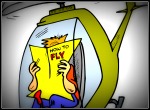Ellen – Helicopter Parenting.
Erin – Is Helicopter Parenting still even a topic? I feel like we were talking about this when our high schoolers were PRE-schoolers.
Ellen – Oh, the Helicopters are out in force, kicking up debris and whipping my bun past the point of stylishly messy. The problem is no one thinks they are THAT parent.
Hovering is not just limited to hiding in the bushes outside of your darling’s classroom.
Erin –The REAL problem is that middle and high schoolers are still being managed like five year olds, and those helicopter parents have transformed into “jet-powered turbo attack models.”
Ellen– We get that it is hard as a parent to pull back and realize your role as a parent is shifting.
Erin – Sideline sitting when you are used to being right in the action is hard for everyone. But the truth is that your child’s esteem is built in the small moments. It may seem easier to remove every obstacle in your child’s way and hover over the minutiae of their lives, but that loses sight of the end game.
Ellen – Every time you solve a small potatoes problem for your child, you rob your child of the chance to learn from their failures. You rob them of developing resilience.
Erin – Furthermore, you are sending the message loud and clear: You can’t handle this. I don’t trust you. You need me to fix this for you.
Ellen – So assuming that most parents don’t even realize they are swooping, let’s shine a spotlight on . . .
The Stealth Helicopter Parent
FLIGHT PATTERN 1
The Perception:
I don’t hover. My middle schooler is allowed to pick out her own clothes and even choose what goes into her lunch.
The Reality:
You are allowing your child to make choices, but are you letting your child make decisions to solve problems?
The Example:
Ellen – I chaperoned for my daughter’s sixth grade overnight environmental camp. My group of girls was lucky enough to have a fabulous educator who not only taught the girls about the Chesapeake Bay, but showed them they had the power to figure things out. On their own.
Right after introductions, she asked the girls to count off. There were about eighteen of them, and they all just shouted out random numbers in unison.
The other chaperones around me twitched and started to jump in. But the educator was prepared for this, because she just held up her hands and firmly declared, “They can do this.”
Before succeeding, they made two more failed attempts, prompting a mother next to me to mutter, “This is ridiculous.”
I replied, “How so?”
“I just don’t have the patience for this. Just count them off and get on with the lesson,” she replied,clearly agitated.
I replied, “This IS the lesson.”
The Problem:
When you don’t let kids work through tasks and proceed through their failed attempts, you end up with kids that can’t even make simple decisions without checking in.
“Miss Ellen, where should I put my clothes while I take a shower?” Really??
FLIGHT PATTERN 2
The Perception:
I don’t do everything for my kids. My 12 year old has a chore chart. He must check off every box or he doesn’t get his allowance. He earns his gold stars.
The Reality:
Chore charts are great for teaching young children what needs to be done. They are wonderful at BUILDING competence, but at some point a child should know what his responsibilities are and be able to follow through when there is no box to be checked and no adult to please.
The Example:
Erin — Recently, as chair of a school fundraising dinner, I had not one, but two, different adults come over to commend me on my fabulous hard-working middle-schooler. What earned him his 5 star review? He refilled the napkins and the silverware BY HIMSELF. WITHOUT being asked or directed by an adult. Many of the other kids just stopped setting places when the napkin and silverware bins were empty.
The Problem:
Really, this just makes us sad. How far we have fallen that the concept of an 11 year old displaying simple competence warrants such high praise? We need to expect more and stop accepting less. At some point, kids should not be working for gold stars but for the pleasure of a job well-done. Kids should be empowered to analyze what needs to be done, and then DO IT.
FLIGHT PATTERN 3
The Perception:
Well, it’s not like I’m writing my fourth grader’s essays for him.
The Reality:
But how much of a crutch are you for him in his schoolwork? Really?
The Example:
Erin – I just let my 4th grader fail a science test, because he didn’t bring home his book to study. The big problem was that he didn’t care that he forgot it. When I voiced my concerns, he blew me off with a simple “I’ll be fine, Mom.” Did I drive him back to school to retrieve the book? Did we call a friend to ask for notes? Did we troll the internet for study guides? Nope, and while it was hard to watch his heart break when he showed us the big red “F” on his test, he was rocked by the experience. He has taken the reins and been charting his own course for success ever since.
The Problem:
Swooping in to solve a problem that a child doesn’t even care about just perpetuates the notion that he doesn’t HAVE to care, you’ll fix it for him. Caring takes effort. Letting a child experience how crappy failure feels SHOWS them that the effort to succeed is worth it. Elementary school is also a great place to not just learn school lessons, but life lessons as well. The stakes are low here, so failure is a perfectly acceptable option AS LONG AS you LEARN from it.
FLIGHT PATTERN 4
The Defense:
When we have a test, I have to make sure my middle schooler studies. There is nothing wrong with that.
The Reality:
“WE” have a test? Give your child the tools to succeed, but then turn them loose to use them at their discretion.
The Example:
Ellen – Last year, my eighth grader decided that despite all she had been taught and shown, she was going to study for her Geometry test by flipping through proofs on the computer instead of working out problems.
I said, “This is not how you have been taught to study. This is not going to work, but I am now going to walk away and let you make your own decision.”
I painfully tore myself away. And she received a D . . . plus. But from that point forward, she started to be a true believer in proper study habits. I now have a freshman who is succeeding under her own steam with the permanent transcript recording away.
The Problem:
Taking responsibility for your child’s wins and losses takes away two things: 1) The opportunity to learn when she fails and 2) The opportunity to celebrate when she wins. Think of yourself as the water boy instead of the quarterback. Give the field back to your kid.
Thomas Edison famously said, “I have not failed. I’ve just found 10,000 ways that won’t work.” If you’re not going to let them find even ONE way to fail, then your kids are never going to get their light bulb moments.
Erin– So here is OUR big “Ah-Ha moment”. . .
Ellen – When you accept that you are prepping human beings for life on their own and not crafting reflections of yourself, it makes it a whole lot easier to get out of that pilot seat you may not have even known you were in.
Erin– Self-realization is a beautiful thing. So move on over and out and get your fannies over to air traffic control. Your job isn’t over, but your child’s needs have shifted. They need you to provide safe skies where they can fly on their own, but they have GOT this.
Ellen – So hand over those controls. The best parents work themselves out of a job.
But if you want to keep the conversation going about Helicopter Parenting, what it is doing to our kids, and how you can avoid the “flight plans”, we recommend Elizabeth Kolbert’s wonderful essay from The New Yorker, “Why do Kids Rule the Roost?”. We look forward to reading Madeline Levine’s new book, Teach Your Children Well: Parenting for Authentic Success.











